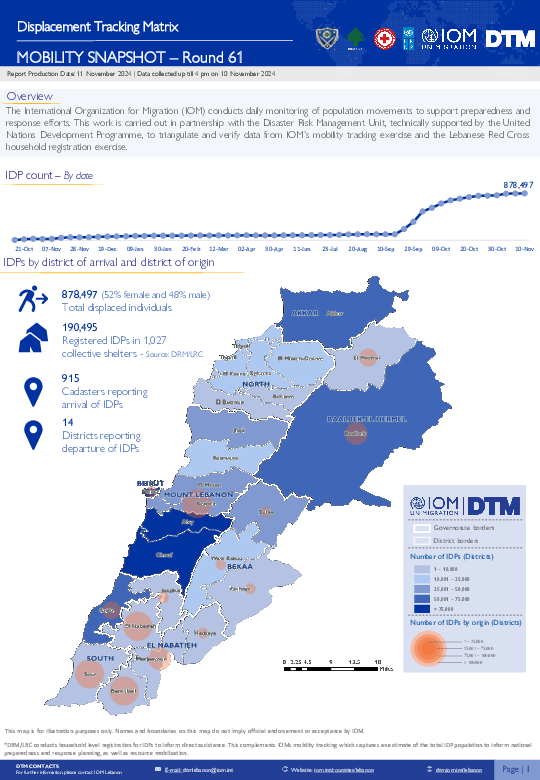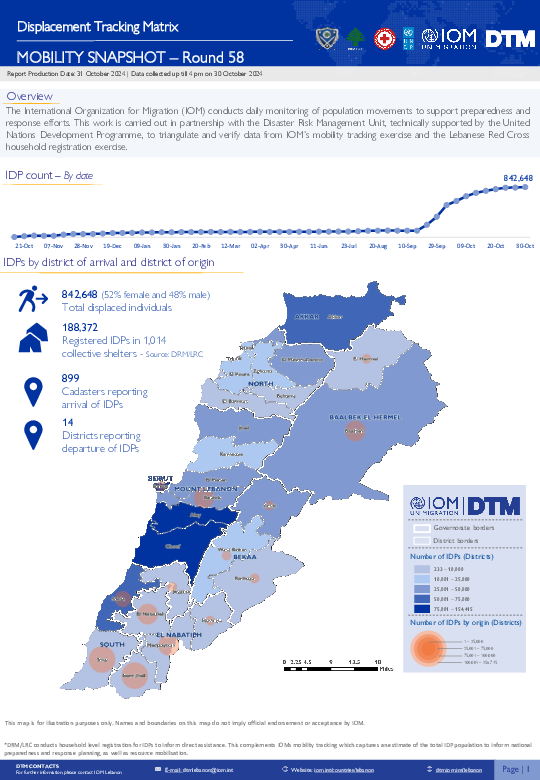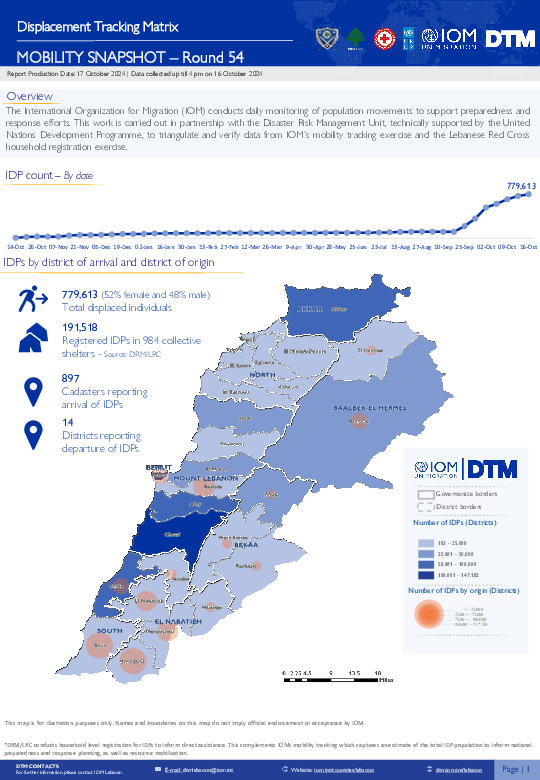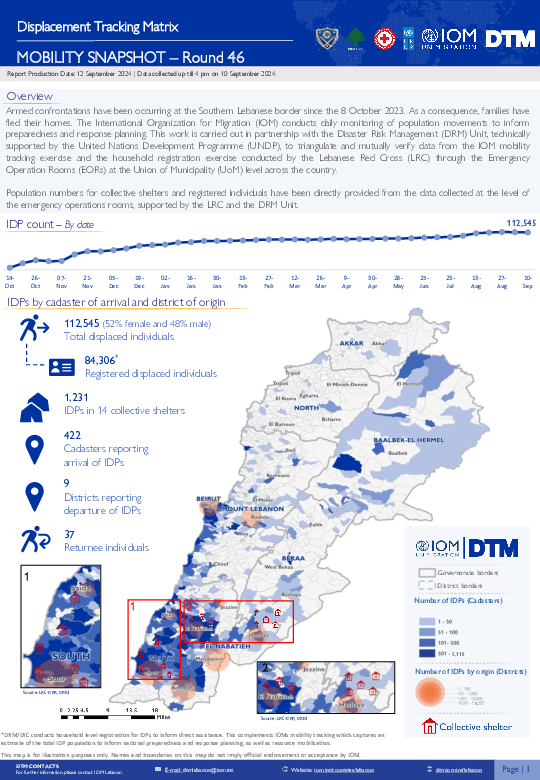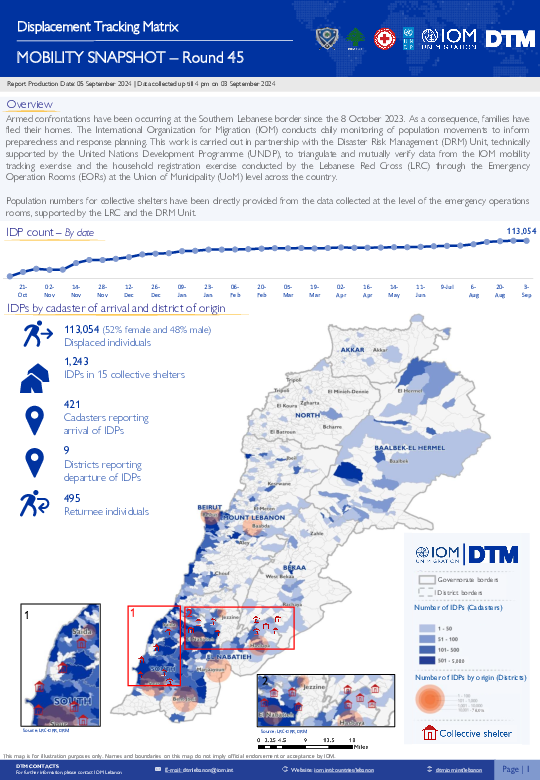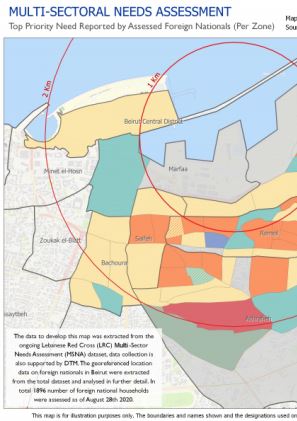-
Countries
-
Data and Analysis
-
Special Focus
-
Crisis Responses
Lebanon
Lebanon
Desplazados internos rastreados
Movimientos de desplazamiento
74,000
IDMC 2023
Ronda de recopilación de datos
Para obtener resultados de búsqueda más avanzados, vaya a la Página de búsqueda avanzada de informes
Mobility Snapshot - Round 63 - 18-11-2024
Since October 8 there has been an increase in cross-border incidents between Israel and Lebanon, resulting in the displacement of people both within the South and elsewhere within the country.
Nov 18 2024
Mobility Snapshot - Round 63 - 18-11-2024
Mobility Snapshot - Round 62 - 14-11-2024
Since October 8 there has been an increase in cross-border incidents between Israel and Lebanon, resulting in the displacement of people both within the South and elsewhere within the country.
Nov 14 2024
Mobility Snapshot - Round 62 - 14-11-2024
Mobility Snapshot - Round 61 - 11-11-2024
Since October 8 there has been an increase in cross-border incidents between Israel and Lebanon, resulting in the displacement of people both within the South and elsewhere within the country.
Nov 11 2024
Mobility Snapshot - Round 61 - 11-11-2024
Lebanon - Mobility Snapshot - Round 60 - 07-11-2024
Since October 8 there has been an increase in cross-border incidents between Israel and Lebanon, resulting in the displacement of people both within the South and elsewhere within the country.
Lebanon - Mobility Snapshot - Round 59 - 04-11-2024
Since October 8 there has been an increase in cross-border incidents between Israel and Lebanon, resulting in the displacement of people both within the South and elsewhere within the country.
Lebanon - Mobility Snapshot - Round 58 - 31-10-2024
Since October 8 there has been an increase in cross-border incidents between Israel and Lebanon, resulting in the displacement of people both within the South and elsewhere within the country.
Lebanon - Mobility Snapshot - Round 57 - 28-10-2024
Since October 8 there has been an increase in cross-border incidents between Israel and Lebanon, resulting in the displacement of people both within the South and elsewhere within the country.
Lebanon - Mobility Snapshot - Round 56 - 24-10-2024
Since October 8 there has been an increase in cross-border incidents between Israel and Lebanon, resulting in the displacement of people both within the South and elsewhere within the country.
Lebanon - Mobility Snapshot - Round 55 - 21-10-2024
Since October 8 there has been an increase in cross-border incidents between Israel and Lebanon, resulting in the displacement of people both within the South and elsewhere within the country.
Lebanon - Mobility Snapshot - Round 54 - 17-10-2024
Since October 8 there has been an increase in cross-border incidents between Israel and Lebanon, resulting in the displacement of people both within the South and elsewhere within the country.
Lebanon - Mobility Snapshot - Round 53 - 14-10-2024
Since October 8 there has been an increase in cross-border incidents between Israel and Lebanon, resulting in the displacement of people both within the South and elsewhere within the country.
Lebanon - Mobility Snapshot - Round 52 - 10-10-2024
Since October 8 there has been an increase in cross-border incidents between Israel and Lebanon, resulting in the displacement of people both within the South and elsewhere within the country.
Lebanon - Mobility Snapshot - Round 51 - 07-10-2024
Since October 8 there has been an increase in cross-border incidents between Israel and Lebanon, resulting in the displacement of people both within the South and elsewhere within the country.
Lebanon - Mobility Snapshot - Round 50 -03-10-2024
Since October 8 there has been an increase in cross-border incidents between Israel and Lebanon, resulting in the displacement of people both within the South and elsewhere within the country.
Lebanon - Mobility Snapshot - Round 49 - 30-09-2024
Since October 8 there has been an increase in cross-border incidents between Israel and Lebanon, resulting in the displacement of people both within the South and elsewhere within the country.
Lebanon - Mobility Snapshot - Round 48 - 26-09-2024
Since October 8 there has been an increase in cross-border incidents between Israel and Lebanon, resulting in the displacement of people both within the South and elsewhere within the country.
Lebanon - Mobility Snapshot - Round 47 - 19-09-2024
Since October 8 there has been an increase in cross-border incidents between Israel and Lebanon, resulting in the displacement of people both within the South and elsewhere within the country.
Lebanon - Mobility Snapshot - Round 46 - 12-09-2024
Since October 8 there has been an increase in cross-border incidents between Israel and Lebanon, resulting in the displacement of people both within the South and elsewhere within the country.
Lebanon - Mobility Snapshot - Round 45 - 05-09-2024
Since October 8 there has been an increase in cross-border incidents between Israel and Lebanon, resulting in the displacement of people both within the South and elsewhere within the country.
Lebanon - Mobility Snapshot - Round 44 - 29-08-2024
Since October 8 there has been an increase in cross-border incidents between Israel and Lebanon, resulting in the displacement of people both within the South and elsewhere within the country.
Lebanon - Mobility Snapshot - Round 43 - 22-08-2024
Since October 8 there has been an increase in cross-border incidents between Israel and Lebanon, resulting in the displacement of people both within the South and elsewhere within the country.
Lebanon - Baseline Assessment Round 4
This report presents the findings of the Migrant Presence Monitoring (MPM) data collection exercise conducted by IOM in Lebanon from May to July 2024, covering all districts.
Aug 21 2024
Lebanon - Baseline Assessment Round 4
Lebanon - Mobility Snapshot - Round 42 - 15-08-2024
Since October 8 there has been an increase in cross-border incidents between Israel and Lebanon, resulting in the displacement of people both within the South and elsewhere within the country.
Lebanon - Mobility Snapshot - Round 41 - 08-08-2024
Since October 8 there has been an increase in cross-border incidents between Israel and Lebanon, resulting in the displacement of people both within the South and elsewhere within the country.
Pagination
Para obtener resultados de búsqueda más avanzados, vaya a la Página de búsqueda avanzada de conjuntos de datos
Mobility Snapshot - Round 62 - 14-11-2024
2024-11-13
<p>Since October 8 there has been an increase in cross-border incidents between Israel and Lebanon, resulting in the displacement of people both within the South and elsewhere within the country. Since October 10, the Displacement Tracking Matrix (DTM) has been conducting the daily monitoring…
Mobility Snapshot - Round 61 - 11-11-2024
2024-11-10
<p>Since October 8 there has been an increase in cross-border incidents between Israel and Lebanon, resulting in the displacement of people both within the South and elsewhere within the country. Since October 10, the Displacement Tracking Matrix (DTM) has been conducting the daily monitoring…
Lebanon - Mobility Snapshot - Round 60 - 07-11-2024
2024-11-06
<p>Since October 8 there has been an increase in cross-border incidents between Israel and Lebanon, resulting in the displacement of people both within the South and elsewhere within the country. Since October 10, the Displacement Tracking Matrix (DTM) has been conducting the daily monitoring…
Lebanon - Mobility Snapshot - Round 59 - 04-11-2024
2024-11-03
<p>Since October 8 there has been an increase in cross-border incidents between Israel and Lebanon, resulting in the displacement of people both within the South and elsewhere within the country. Since October 10, the Displacement Tracking Matrix (DTM) has been conducting the daily monitoring…
Lebanon - Mobility Snapshot - Round 58 - 31-10-2024
2024-10-30
<p>Since October 8 there has been an increase in cross-border incidents between Israel and Lebanon, resulting in the displacement of people both within the South and elsewhere within the country. Since October 10, the Displacement Tracking Matrix (DTM) has been conducting the daily monitoring…
Lebanon - Mobility Snapshot - Round 57 - 28-10-2024
2024-10-27
<p>Since October 8 there has been an increase in cross-border incidents between Israel and Lebanon, resulting in the displacement of people both within the South and elsewhere within the country. Since October 10, the Displacement Tracking Matrix (DTM) has been conducting the daily monitoring…
Lebanon - Mobility Snapshot - Round 56 - 24-10-2024
2024-10-23
<p>Since October 8 there has been an increase in cross-border incidents between Israel and Lebanon, resulting in the displacement of people both within the South and elsewhere within the country. Since October 10, the Displacement Tracking Matrix (DTM) has been conducting the daily monitoring…
Lebanon - Mobility Snapshot - Round 55 - 21-10-2024
2024-10-20
<p>Since October 8 there has been an increase in cross-border incidents between Israel and Lebanon, resulting in the displacement of people both within the South and elsewhere within the country. Since October 10, the Displacement Tracking Matrix (DTM) has been conducting the daily monitoring…
Lebanon - Mobility Snapshot - Round 54 - 17-10-2024
2024-10-16
<p>Since October 8 there has been an increase in cross-border incidents between Israel and Lebanon, resulting in the displacement of people both within the South and elsewhere within the country. Since October 10, the Displacement Tracking Matrix (DTM) has been conducting the daily monitoring…
Lebanon - Mobility Snapshot - Round 53 - 14-10-2024
2024-10-13
<p>Since October 8 there has been an increase in cross-border incidents between Israel and Lebanon, resulting in the displacement of people both within the South and elsewhere within the country. Since October 10, the Displacement Tracking Matrix (DTM) has been conducting the daily monitoring…
Lebanon - Mobility Snapshot - Round 52 - 10-10-2024
2024-10-08
<p>Since October 8 there has been an increase in cross-border incidents between Israel and Lebanon, resulting in the displacement of people both within the South and elsewhere within the country. Since October 10, the Displacement Tracking Matrix (DTM) has been conducting the daily monitoring…
Lebanon - Mobility Snapshot - Round 51 - 07-10-2024
2024-10-06
<p>Since October 8 there has been an increase in cross-border incidents between Israel and Lebanon, resulting in the displacement of people both within the South and elsewhere within the country. Since October 10, the Displacement Tracking Matrix (DTM) has been conducting the daily monitoring…
Lebanon - Mobility Snapshot - Round 50 -03-10-2024
2024-10-02
<p>Since October 8 there has been an increase in cross-border incidents between Israel and Lebanon, resulting in the displacement of people both within the South and elsewhere within the country. Since October 10, the Displacement Tracking Matrix (DTM) has been conducting the daily monitoring…
Lebanon - Mobility Snapshot - Round 49 - 30-09-2024
2024-09-29
<p>Since October 8 there has been an increase in cross-border incidents between Israel and Lebanon, resulting in the displacement of people both within the South and elsewhere within the country. Since October 10, the Displacement Tracking Matrix (DTM) has been conducting the daily monitoring…
Lebanon - Mobility Snapshot - Round 48 - 26-09-2024
2024-09-25
<p>Since October 8 there has been an increase in cross-border incidents between Israel and Lebanon, resulting in the displacement of people both within the South and elsewhere within the country. Since October 10, the Displacement Tracking Matrix (DTM) has been conducting the daily monitoring…
Lebanon - Mobility Snapshot - Round 47 - 19-09-2024
2024-09-17
<p>Since October 8 there has been an increase in cross-border incidents between Israel and Lebanon, resulting in the displacement of people both within the South and elsewhere within the country. Since October 10, the Displacement Tracking Matrix (DTM) has been conducting the daily monitoring…
Lebanon - Mobility Snapshot - Round 46 - 12-09-2024
2024-09-10
<p>Since October 8 there has been an increase in cross-border incidents between Israel and Lebanon, resulting in the displacement of people both within the South and elsewhere within the country. Since October 10, the Displacement Tracking Matrix (DTM) has been conducting the daily monitoring…
Lebanon - IDP Tracking Dataset - ROUND 45 - 05-09-2024
2024-09-03
<p>Since October 8 there has been an increase in cross-border incidents between Israel and Lebanon, resulting in the displacement of people both within the South and elsewhere within the country. Since October 10, the Displacement Tracking Matrix (DTM) has been conducting the daily monitoring…
Lebanon - IDP Tracking Dataset - ROUND 43 - 22-08-2024
2024-08-20
<p>Since October 8 there has been an increase in cross-border incidents between Israel and Lebanon, resulting in the displacement of people both within the South and elsewhere within the country. Since October 10, the Displacement Tracking Matrix (DTM) has been conducting the daily monitoring…
Lebanon - IDP Tracking Dataset - ROUND 42 - 15-08-2024
2024-08-13
<p>Since October 8 there has been an increase in cross-border incidents between Israel and Lebanon, resulting in the displacement of people both within the South and elsewhere within the country. Since October 10, the Displacement Tracking Matrix (DTM) has been conducting the daily monitoring…
Pagination
Lebanon — Foreign Nationals MSNA Analysis: Type of Assistance Received by Foreign Nationals (September 2020)
On 4th August 2020, a large explosion occurred at the port of Beirut, Lebanon that left more than 6,500 individuals injured and caused at least 180 deaths. To assess the impact of the explosion and the arising needs and vulnerabilities, the Lebanese Red Cross (LRC), in coordination with the Office for the Coordination of Humanitarian Affairs (OCHA), have conducted large multi-sectoral needs assessments (MSNA) across 11,008 households. To support these efforts as well as draw attention to the gap on the needs and vulnerabilities of foreign nationals that were affected by the explosion, IOM has undertaken a secondary data review of LRC’s data. This map uses the data of 1,896 foreign national households with migrant workers in Beirut to provide an overview on the type of assistance received by foreign nationals. For information on the Foreign Nationals Multi-Sector Needs Assessment Analysis Report, please visit: https://migration.iom.int/node/9637
Lebanon —Foreign Nationals MSNA Analysis: Priority Needs Reported by Foreign Nationals (September 2020)
On 4th August 2020, a large explosion occurred at the port of Beirut, Lebanon that left more than 6,500 individuals injured and caused at least 180 deaths. To assess the impact of the explosion and the arising needs and vulnerabilities, the Lebanese Red Cross (LRC), in coordination with the Office for the Coordination of Humanitarian Affairs (OCHA), have conducted large multi-sectoral needs assessments (MSNA) across 11,008 households. To support these efforts as well as draw attention to the gap on the needs and vulnerabilities of foreign nationals that were affected by the explosion, IOM has undertaken a secondary data review of LRC’s data. This map uses the data of 1,896 foreign national households with migrant workers in Beirut to provide an overview on the priority needs.For information on the Foreign Nationals Multi-Sector Needs Assessment Analysis Report, please visit: https://migration.iom.int/node/9637
Lebanon — Foreign Nationals MSNA Analysis: Population Overview (September 2020)
On 4th August 2020, a large explosion occurred at the port of Beirut, Lebanon that left more than 6,500 individuals injured and caused at least 180 deaths. To assess the impact of the explosion and the arising needs and vulnerabilities, the Lebanese Red Cross (LRC), in coordination with the Office for the Coordination of Humanitarian Affairs (OCHA), have conducted large multi-sectoral needs assessments (MSNA) across 11,008 households. To support these efforts as well as draw attention to the gap on the needs and vulnerabilities of foreign nationals that were affected by the explosion, IOM has undertaken a secondary data review of LRC’s data. This map uses the data of 1,896 foreign national households with migrant workers in Beirut to provide an overview on the nationalities of foreign nationals.For information on the Foreign Nationals Multi-Sector Needs Assessment Analysis Report, please visit: https://migration.iom.int/node/9637
Lebanon — Foreign Nationals MSNA Analysis: Post-Incident Household Assistance (September 2020)
On 4th August 2020, a large explosion occurred at the port of Beirut, Lebanon that left more than 6,500 individuals injured and caused at least 180 deaths. To assess the impact of the explosion and the arising needs and vulnerabilities, the Lebanese Red Cross (LRC), in coordination with the Office for the Coordination of Humanitarian Affairs (OCHA), have conducted large multi-sectoral needs assessments (MSNA) across 11,008 households. To support these efforts as well as draw attention to the gap on the needs and vulnerabilities of foreign nationals that were affected by the explosion, IOM has undertaken a secondary data review of LRC’s data. This map uses the data of 1,896 foreign national households with migrant workers in Beirut to provide an overview on the post-incident household assistance. For information on the Foreign Nationals Multi-Sector Needs Assessment Analysis Report, please visit: https://migration.iom.int/node/9637




